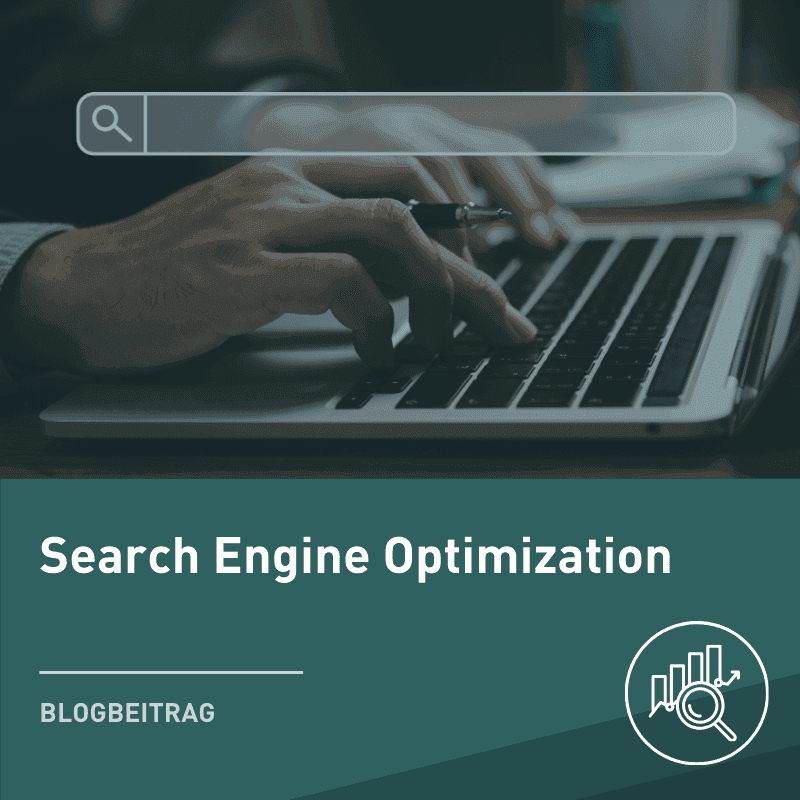
Blog Post
SEO

Axel
Vortex
published on:
12.09.2013
The 'Entity'-Based Search – Is It the End of Keyword Research?
Table of Contents
Search engine optimization has always been based on keywords. However, with Google's ability to semantically analyze content, the fundamental conditions are changing. The Knowledge Graph showed the paths the future of search will most likely take, but that is by no means the end. What this means for SEO and keyword research and optimization is discussed in this blog post.
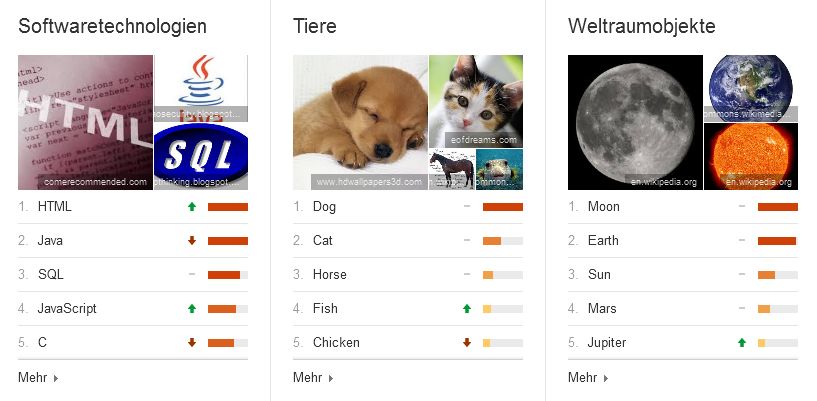
In the past, the process of a search query was relatively simple: a user entered one or more search terms into Google's search bar and received results based on these keywords that Google's algorithm deemed relevant. However, it has not been that simple for quite some time, and the Venice Update certainly demonstrated this.
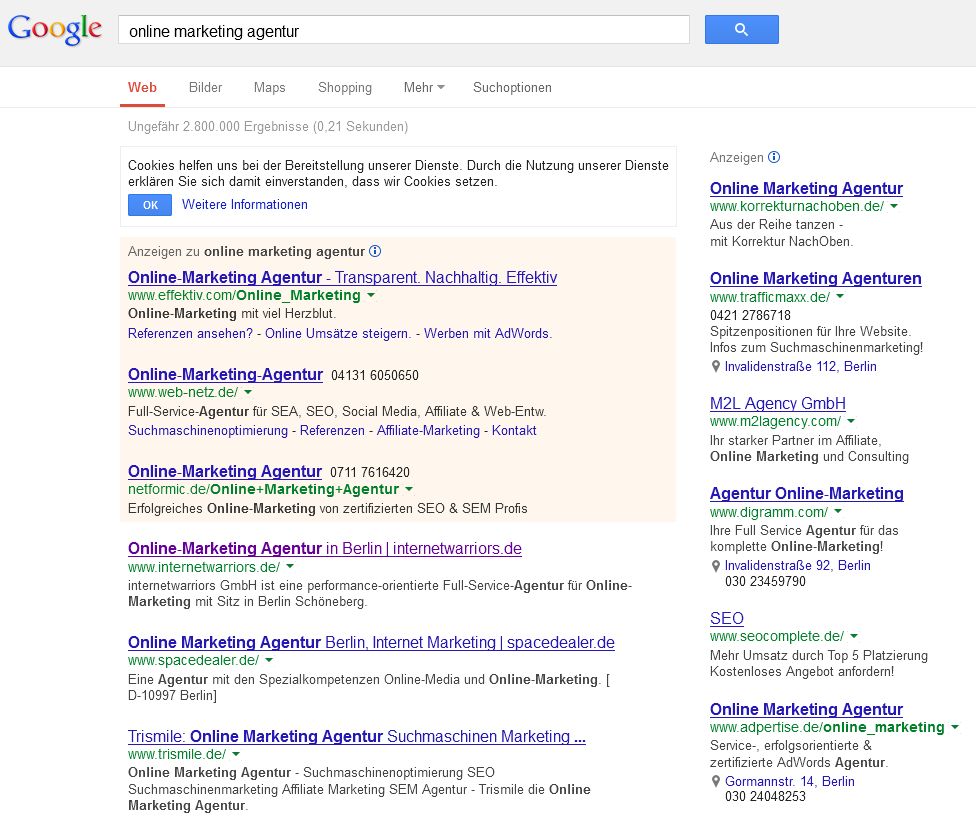
Google local results
Explicit and Implicit Influences on Search Results
Beyond the explicit aspects of a search query, meaning the terms directly entered into the search field, implicit aspects that influence the results are becoming important: from which device the search is made, at what time, at what location, in which city, in which country, and the search history of the user.
On Moz.com, Tom Anthony summarizes it with this formula:
Search query = explicit aspects + implicit aspects
But what if this is just the beginning? Is it conceivable that in a few years, search results will no longer be based on search queries but on implicit factors alone? The app Google Now could offer a glimpse of the future because that is exactly what happens: users receive information tailored to their behavior and habits without entering a keyword-based search: "You receive cards with useful information for your day—even before you search for it."

Google Now
Various tests and updates in the search results and the search algorithm in recent years ensure that today's results list stands out significantly from the pure website-based results of the past and gives a hint of the future:
Personalized search results: Location-adjusted results and the integration of content from the Google Mail account
Social signals, integration of authorship, the topic of Author Rank
The identification of structured data and the integration of Rich Snippets into the search results
Google's increasing understanding of natural language as opposed to pure keyword-based search queries
It appears: Understanding rather than indexing is Google's goal. The Knowledge Graph is the beginning of this. The ultimate goal could be entity search.
The Entity Search of the Future
In an interview with Barbara Starr, an expert in semantic search, on search engine land, the expert suggests what the evolution of semantic search could mean for the future of SEO. With the introduction of the Knowledge Graph last year, Google pointed out that it's no longer just about strings. Instead, search increasingly relies on the interpretation of "search objects." To interpret search queries in this way, Google creates entities, an "entity graph" that maps the meaning and relationships between terms. The basis is on the one hand the interpretation of the searcher's intent, and on the other, the user's context: Where are they located, which device are they using, etc.
A pure entity search would mean for websites: Those not recognized as an entity will not be found! The conclusion is that SEOs in the future would be obliged to view their content not through the keyword lens but instead to create machine-readable entities that answer defined search queries. Semantics and structured data are the important keywords here.
The Webmaster Tools provide clues about the growing importance of structured data, as they've been evaluated there for some time:
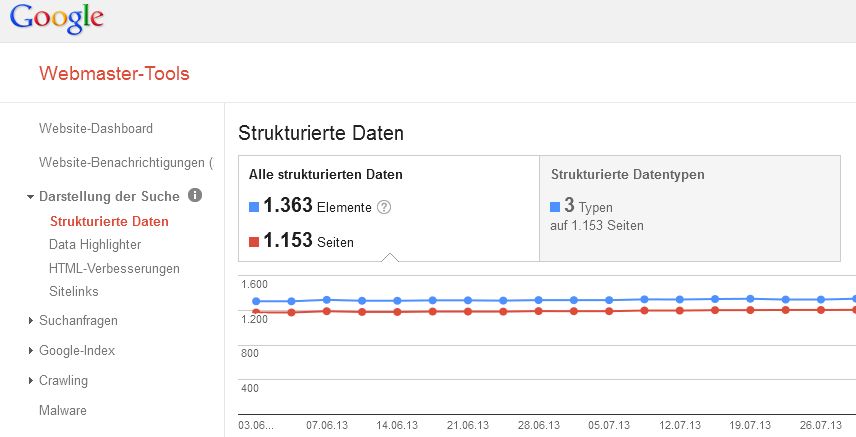
Structured data in Webmaster Tools. A small glimpse of entities can be found in the "Top Charts" in Google Trends. Here, search queries are already assigned to a (still quite manageable) number of entities.
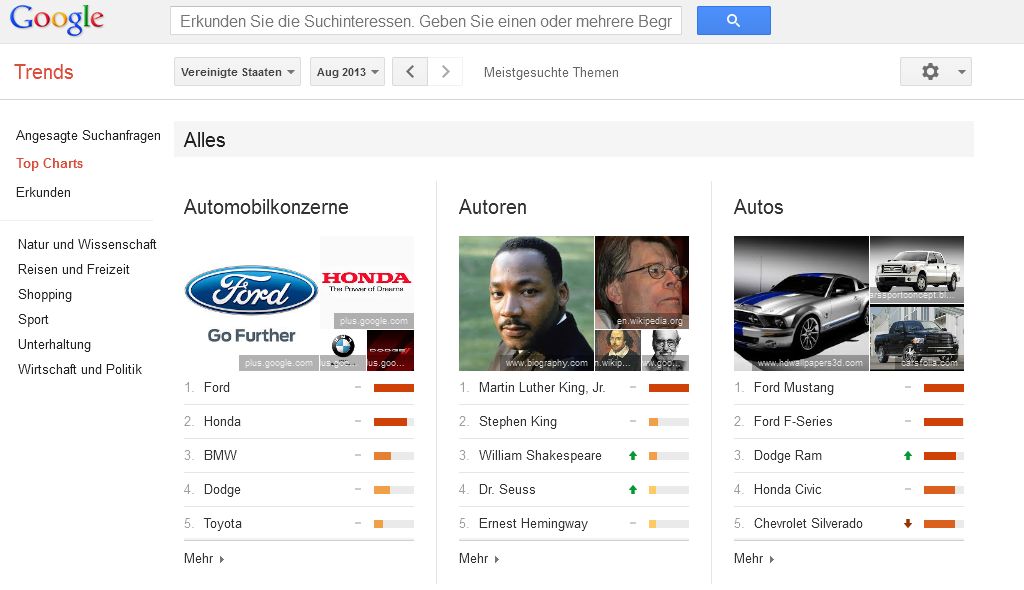
With a purely entity-based search, the use of keywords on a website would no longer be important, it would even be completely ineffective as long as Google does not recognize entities on the website.
Of course, it is still (a long time?) not that far. But it cannot hurt to deal with markups and designations using schema.org early on. Even if not all markups yet show a visible effect in search results, it is reasonable to use as many relevant markups as possible in advance to be prepared.

But Google goes further: Bill Slawski points on his blog to a patent titled "Search entity transition matrix and applications of the transition matrix," that not only addresses the assignment of people, things, or places to entities, but Google "search entities," creating and analyzing the relationships between them.
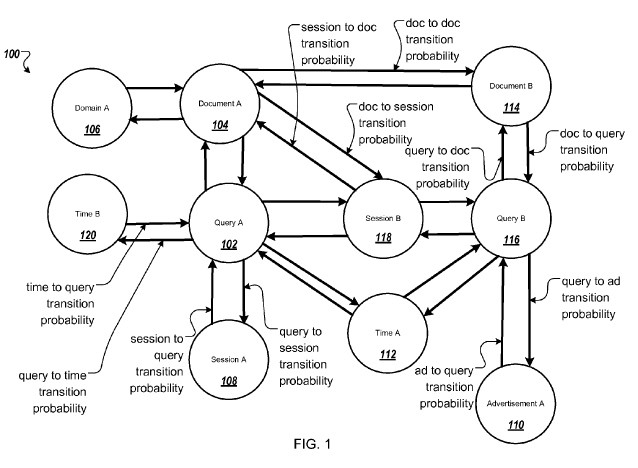
In the patent abstract, it reads as follows:
Methods, systems, and apparatus, including computer programs encoded on computer storage media, for using search entity transition probabilities. In some implementations, data identifying entities and transition probabilities between entities is stored in a computer-readable medium. Each transition probability represents a strength of a relationship between a pair of entities as they are related in search history data. In some implementations, an increase in popularity for a query is identified and a different query is identified as temporally related to the query. Scoring data for documents responsive to the different query is modified to favor newer documents. In other implementations, data identifying a first session as spam is received, and a spam score is calculated for either a second session of queries or a single query using transition probabilities. The second session (or single query) is identified as spam from the spam score.
But what exactly are "search entities"?
The search query that a user enters
Documents delivered as a result of this search query
Documents the user clicks on
The time spent on these results
The search session in which the user makes the search query (defined by a certain duration, a set number of queries, a certain period of inactivity, user login, or the similarity of entered queries, defined for example by similarity in spelling, abbreviations, or synonyms)
The time at which the search query is made
Ads delivered as a result of the search query
The domain that a document is associated with
Link texts in a document
What does Google do with these entities now?
A probability value is calculated based on the relationship between these various types of entities. These probabilities can have different impacts, for example:
Relationships between entities are determined as well as the strength of these relationships by analyzing, for instance, the user's search history.
Using these relationships, values from one entity can be passed on to other related entities.
Entities for which there is not enough search history data can be assigned values with the help of related entities for which sufficient data exists.
These relationships can also be used to rank search results more precisely and deliver vertical search results.
Queries that are gaining popularity can be identified, and the focus is placed on delivering current results for them (Recall the Freshness Update from nearly two years ago.)
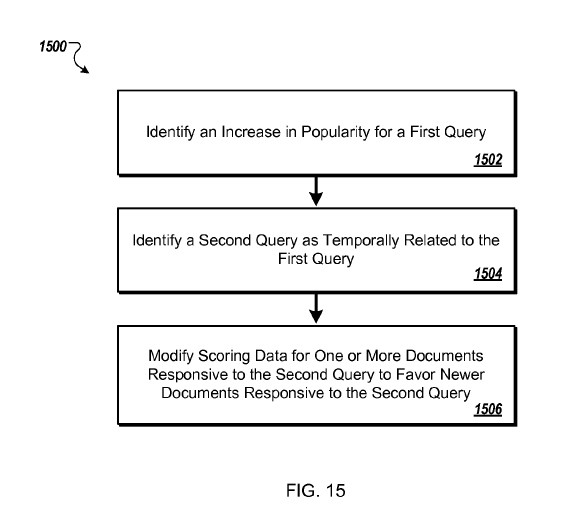
The relationships between entities can be used to suggest search queries to users.
Linking from related documents can be used to rank results for certain search queries anew.
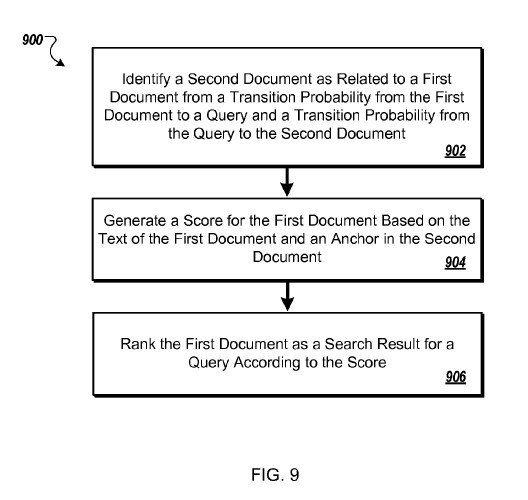
And what does that mean practically? An example.
Google determines the strength of the relationship between a document (search result) and the entered search query using entities and calculates the probability that the user will click on this result for a specific search query. An important criterion for the quality of a result can be, for example, the time spent. The illustration from the patent gives a small insight into the analyzed entities:
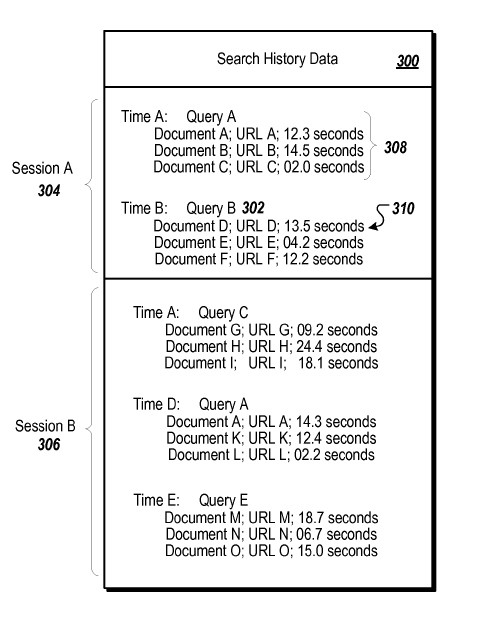
Conclusion: Have Keywords Lost Their Meaning?
Given these developments, one might dismiss the importance of keywords and the practice of keyword research. But that would be premature. While optimization is more complex today than it was years ago when using keywords in the title tag, headings, and content were the key measures, the usefulness of keywords should not be overlooked.
Keyword research and analysis are still legitimate practices that provide many valuable insights:
They help analyze the language of the target audience and ensure that your content is understood and properly perceived by users.
Keywords can help understand the intentions and needs of the target audience.
Synonyms and related terms can be identified that play a crucial role in high-quality content, contributing to a good writing style, readability, and understanding even if Google's search is entirely entity-based.
Keyword research helps reveal connections and properly map the categorization of content on the website or online shop with suitable categories. A logical structure with meaningful navigation might become irrelevant for Google, but will always be necessary for usability reasons.
Keyword research helps gauge the competition and value of a keyword: How much effort will the optimization likely involve, and how expensive is it to focus on AdWords first instead of SEO? Which product areas should be expanded and enriched with content, and for which business areas is it particularly worthwhile to expand the editorial section and gain links?
However, it is always important to keep the context in mind. Creating landing pages based solely on keywords is not always the best option. Instead, it may increasingly depend on analyzing the target audience for their contexts and providing relevant landing pages for these groups and their respective situations.
SUBSCRIBE TO THE NEWSLETTER NOW
In any case, it is crucial to observe the developments of semantic search and learn how Google classifies and interprets terms. Besides Google Trends mentioned above, the Suggest function and related search queries can help here. It is also important to keep an eye on how the Knowledge Graph develops and to understand which definitions Google uses for keywords and which terms support Google in understanding keyword relationships and avoiding false assignments. Here, keywords as a natural part of language use are still important but do not replace structured data and—more in the future—entities.
Are you looking for competent support in the field of search engine optimization? Contact us; our SEO experts will be happy to advise and support you with all On Page and Off Page questions and will apply the current insights practically for you and your company. Get in touch with us!

Axel
Vortex
Axel Zawierucha is a successful businessman and an internet expert. He began his career in journalism at some of Germany's leading media companies. As early as the 1990s, Zawierucha recognized the importance of the internet and moved on to become a marketing director at the first digital companies, eventually founding internetwarriors GmbH in 2001. For 20 years – which is an eternity in digital terms! – the WARRIORS have been a top choice in Germany for comprehensive online marketing. Their rallying cry then and now is "We fight for every click and lead!"

